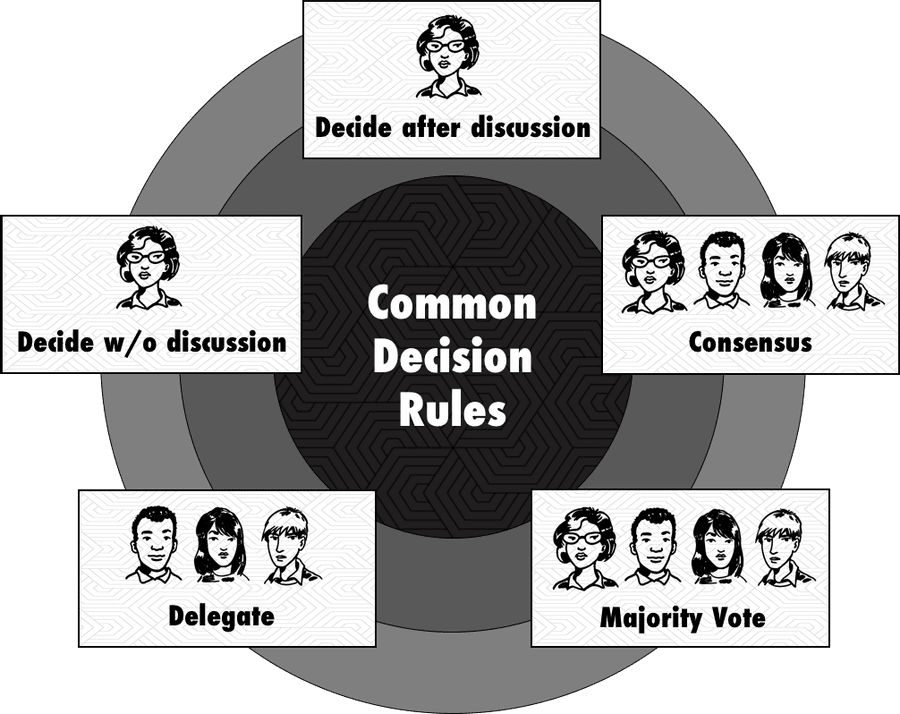Decision Time: How Decision Rules Help You Make Better Product Decisions
Curated from: romanpichler.medium.com
Ideas, facts & insights covering these topics:
7 ideas
·630 reads
5
Explore the World's Best Ideas
Join today and uncover 100+ curated journeys from 50+ topics. Unlock access to our mobile app with extensive features.
The Team Impact Of A Decision
If it’s unclear how a decision is made and whose input is required, people will be unsure if a decision has actually been made and if it should be actioned. Some people will start to implement the decision, while others ignore it instead of following it through.
If you want people to move together in the same direction, you need to give them a clear indicator if a decision has been made: you should clearly state how the decision is reached and whose input is required. In other words, you should apply the right decision rule.
22
160 reads
Types Of Decision Rules: Decision By Consensus
Deciding by consensus means that everyone required to make the decisions agrees with the proposed solution or idea. A consensus-based decision creates strong buy-in and shared ownership, and it leverages the collective creativity and knowledge of the people present — everybody involved contributes to the decision. It is particularly helpful when the stakes are high and you make a strategic product decision.
23
138 reads
A Horse, Not A Camel
Watch out that a consensus-based approach does not degenerate into a decision by committee where people agree on the smallest common denominator and broker a weak compromise. This is unlikely to result in a sustainable agreement and translate into a successful product.
As the saying goes, “a camel is a horse designed by a committee.” Consensus, instead, means that everybody is happy with the decision and wholeheartedly supports it.
22
85 reads
Types Of Decision Rules: Product Manager Decides after Discussion
This decision rule requires you to discuss an idea or solution with the right people and poll them for their opinions as well as any data that backs them up. Once enough discussion has taken place or the time is up, you decide. A good example would be deciding how to evolve the product backlog. You may ask the stakeholders and development team for their input, but after some discussion you might decide if new stories are added or not, and how to prioritise them.
22
75 reads
Types Of Decision Rules: Delegation
Delegate a decision if others are better qualified to decide or if your input is not needed. As the person in charge of the product, you would typically expect that the development team takes care of all technical decisions. But you might also delegate decisions about how to refine some of the user stories to the team, if people have enough knowledge about the users, the product, and how to create new stories.
Delegation helps ensure that the best qualified people decide, and it frees up your time.
22
58 reads
Types Of Decision Rules: Majority Vote
A majority vote means that most of the people required to decide agree with the proposed solution or idea. Applying this rule is simple and comparatively fast. But it creates a win-lose situation that can leave the One should use this rule for product decisions only if the stakes are not high. Asking the key stakeholders to vote on a major strategy change would probably not be appropriate, and you would be better off using consensus or product manager decisions after discussion.
22
53 reads
Types Of Decision Rules: Product Manager Decides without Discussion
As the person in charge of the product, you don’t have to involve others in all your decisions, of course: There are lots of low-impact decisions that you can and should make on your own.
This decision rule will only help you if you have the right knowledge to make the decision and you don’t need the buy-in from others.
22
61 reads
IDEAS CURATED BY
CURATOR'S NOTE
As product managers and product owners, we make a myriad of decisions — from shaping the product strategy and determining the product roadmap to deciding the detailed functionality of our products. But do we make all these decisions effectively? And do we always secure the necessary buy-in? This stash helps you make better decisions. It discusses five common decision rules and explains when to apply them.
“
Makayla D.'s ideas are part of this journey:
Learn more about leadershipandmanagement with this collection
How to align stakeholders
Best practices in product management leadership
How to create value together
Related collections
Similar ideas
Read & Learn
20x Faster
without
deepstash
with
deepstash
with
deepstash
Personalized microlearning
—
100+ Learning Journeys
—
Access to 200,000+ ideas
—
Access to the mobile app
—
Unlimited idea saving
—
—
Unlimited history
—
—
Unlimited listening to ideas
—
—
Downloading & offline access
—
—
Supercharge your mind with one idea per day
Enter your email and spend 1 minute every day to learn something new.
I agree to receive email updates

